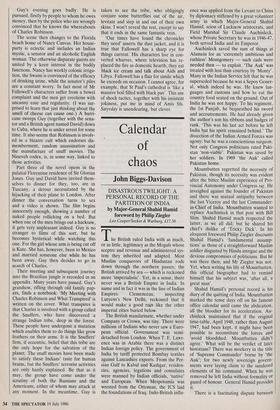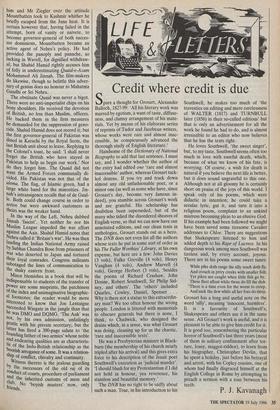Calendar of chaos
John Biggs-Davison
DISASTROUS TWILIGHT: A PERSONAL RECORD OF THE PARTITION OF INDIA by Major-General Shahid Hamid foreword by Philip Ziegler
Leo CooperlSecker & Warburg, f17.50
The British ruled India with as much, or as little, legitimacy as the Moguls whose sceptre and revenue and administered sys- tem they inherited and adapted. Most Muslim conquerors of Hindustan rode down through the .northern passes; the British arrived by sea — which is reckoned more 'imperialistic'. Yet, in a sense, there never was a British Empire in India. In name and in fact it was in the line of Indian Empires. Clemenceau, inspecting Lutyens's New Delhi, reckoned that it would make a good ruin like the other imperial cities buried below.
The British mandarinate, whether.under Company or Crown, was tiny. There were millions of Indians who never saw a Euro- pean official. Government was semi- detached from London. When T. E. Lawr- ence was in Arabia there was a distinct Indian foreign policy. The government of India by tariff protected Bombay textiles against Lancashire exports. From the Per- sian Gulf to Kabul and Kashgar, residen- cies, agencies, legations and consulates were manned by Indian officials, 'native' and European. When Mespotamia was wrested from the Ottoman, the ICS laid the foundations of Iraq. Indo-British influ- ence was applied from the Levant to China by diplomacy stiffened by a great volunteer army in which Major-General Shahid Hamid, scion of Lucknow aristocrats, and Field Marshal Sir Claude Auchinleck, whose Private Secretary he was in 1946-47, both served India and its Emperor.
Auchinleck saved the sum of things at Alamein for an 'extremely ambitious and ruthless' Montgomery — such cads were needed then — to exploit. 'The Auk' was treated with less than courtesy by 'Monty'. Many in the Indian Service felt that he was superseded because he was a Sepoy Gener- al, which indeed he was. He knew lan- guages and customs and how to eat the country food seated on the ground. Out of India he was not happy. To his regiment, the 1st Punjab, he bequeathed his sword and accoutrements. He had already given the author's son his ribbons and badges of rank. 'This was his last act before he left India but his spirit remained behind.' The dissection of the Indian Armed Forces was agony; but he was a conscientious surgeon. Not only Congress politicians rated Paki- stan 'non-viable'. Pakistan was saved by her soldiers. In 1969 `the Auk' called Pakistan home.
Mountbatten regretted the necessity of Pakistan, though its necessity was evident after the bitter Muslim experience of Pro- vincial Autonomy under Congress raj. He inveighed against the founder of Pakistan and there was mutual antipathy between the last Viceroy and the last Commander- in-Chief of India. Mountbatten wanted to replace Auchinleck in that post with Bill Slim. Shahid Hamid much respected the latter, as we all did; but he shared his chief's dislike of 'Tricky Dick'. In his eloquent foreword Philip Ziegler discounts Shahid Hamid's 'fundamental assump- tions' as those of a straightforward Muslim soldier disgusted by Hindu intrigue and the devious compromises of politicians. But he was there then; and Mr Ziegler was not. Yet, when writing his life of Mountbatten, this official biographer had to remind himself that his subject was, 'after all, a great man'.
Shahid Hamid's personal record is his diary of the quitting of India. Mountbatten marked the tense days off on his famous office calendar until came the abdication, all the bloodier for its acceleration. Au- chinleck maintained that if the original time-table, April 1948, rather than August 1947, had been kept, it might have been possible to reconstitute the forces and `avoid bloodshed. Mountbatten didn't agree.' What will be the verdict of later historians? There was mockery in the title of 'Supreme Commander' borne by 'the Auk'; for two newly sovereign govern- ments were laying claim to the sundered elements of his command. When he was removed he left India without formality or guard of honour. General Hamid provides it.
There is a fascinating dispute between him and Mr Ziegler over the attitude Mountbatten took to Kashmir whither he briefly escaped from the June heat. It is certain however that, having failed in the attempt, born of vanity or naivete, to become governor-general of both succes- sor dominions, Mountbatten became an active agent of Nehru's policy. He had provided the panoply and panache, so lacking in Wavell, for dignified withdraw- al; but Shahid Hamid rightly accuses him of folly in underestimating Quaid-e-Azam Mohammed Ali Jinnah. The film-makers do likewise, though to belittle this adver- sary of genius does no honour to Mahatma Gandhi or Sri Nehru.
The obstinate Quaid was never a bigot. There were no anti-imperialist chips on his bony shoulders. He received the devotion of British, no less than Muslim, officers. He backed them in the firm measures he demanded for the suppression of geno- cide. Shahid Hamid does not record it; but the first governor-general of Pakistan was dined in Karachi by the Royal Scots, the last British unit about to leave. Replying to the Colonel's toast, he said: 'I shall never forget the British who have stayed in Pakistan, to help us begin our work.' Nor do they forget him. The Quaid did not want the Armed Forces communally di- vided. His Pakistan was not that of the Werna. The flag, of Islamic green, had a large white band for the minorities. Jin- nah's intransigence recalls that of de Gaul- le. Both could change course in order to arrive but were awkward customers as theirs was the weaker hand.
In the way of the Left, Nehru dubbed Jinnah 'fascist'. Yet neither he nor his Muslim League impeded the war effort against the Axis. Shahid Hamid notes that Nehru called it 'Britain's war'. He was then lauding the Indian National Army raised by Subhas Chandra Bose from prisoners of war who deserted to Japan and tortured their loyal comrades. Congress militants sabotaged the lines of communication to the shaky eastern front. Minor blemishes in a book that will be indispensable to students of the transfer of Power are some misprints, the patchiness of the index and unimaginative biographic- al footnotes: the reader would be more interested to know that Joe Lentaigne succeeded Wingate in the jungle than that he was DMO and DQMG. 'The Auk' was not, by his own admission, unfailingly gentle with his private secretary; but the latter has fired a 300-page salute to 'the founding father of two armies' whose noble and endearing qualities are as characteris- tic of the Indo-British relationship as the boorish arrogance of some. It was a relation- ship of conflict, chivalry and continuity. , Witness thereto is the jealous guarding by the successors of the old raj of its Conduct of courts, procedure of parliament and the inherited customs of mess and „club- No 'boyish masters' now, only mends.



















































 Previous page
Previous page